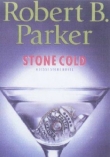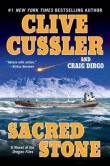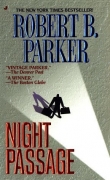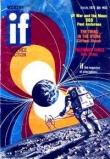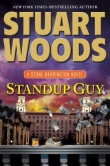
Текст книги "Foreign Affairs"
Автор книги: Stuart Woods
сообщить о нарушении
Текущая страница: 5 (всего у книги 14 страниц)
18
Hedy took her easel back into the mews and set it up, while Stone returned to his book. He had been reading for no more than ten minutes when a chime chimed. It took Stone a moment to remember what rang the chime, then it came to him: it rang when somebody opened the door in the big gates. By the time he got to his feet, somebody was ringing the doorbell.
He opened the door to find Rick LaRose, as predicted. “Hello, Stone,” Rick said, smiling and offering his hand.
“How did you get in?” Stone asked.
“I have a key,” Rick replied. “Have you forgotten from whom you bought this house?”
He had bought it from the Paris station, which had formerly used it as a safe house. “How are things at the Paris station?” he asked as he offered Rick a chair.
“Fairly calm at the moment. It’s one of those welcome periods where we’re not in the middle of a flap of some sort.”
“It sounds restful.”
“Boring, is more like it.”
“Lance said you are going to ask me to do something I won’t want to do.”
Rick looked a little embarrassed. “Well, yes. What’s more, it’s not something that I want to ask you to do.”
“As bad as that?”
Rick shrugged.
“Are you just trying to make things less boring for yourself?”
“Oh, sure, but there’s a real purpose in it, too. It’s something that could help us make things materially better in Europe.”
“Better for whom?”
“For Europeans.”
“Okay, spit it out.”
Rick was now looking sheepish. “We’d like you to let us leak your location to Leo Casselli.”
Stone winced. “I don’t think I could have heard you correctly, Rick.”
“I’m afraid you did.”
“Look, I’ve just fled Rome in order to get out of Casselli’s reach. How far do I have to go? London? Iceland? Home to New York?”
“It’s like this,” Rick said. “There’s a guy in Rome, Massimo Bertelli, who has just taken over the DIA, the Italian department that is trying to root out the Mafia.”
“I’ve heard the name,” Stone said.
Rick looked surprised. “Where did you hear of him?”
“From Dino Bacchetti.”
“Dino Bacchetti in New York?”
“Right now he’s upstairs taking a nap.”
“I didn’t see him on the arrivals list,” Rick said.
“Arrivals list?”
“Every day the embassy circulates a list of prominent Americans who are visiting France. Dino wasn’t on it.”
“It’s a private visit,” Stone said. “He’s just here for the weekend, with his wife.”
“Nevertheless, we like to know who’s in town.”
“Now you know. Dino has been in touch with Massimo Bertelli about Marcel duBois’s and my problem with Casselli.”
“Oh, good, that will save me the trouble of informing him.”
“I guess so. Are you going to tell me what you—rather, what Lance—wants?”
“It’s partly to do with an expansion of my job. The Agency wants station heads to be more concerned with what happens in Europe as a whole, rather than just in our individual bailiwicks. We’re beginning to think of the European Union as more of a United States of Europe, rather than a lot of independent countries.”
“Well, that’s very cosmopolitan of the Agency, Rick, but what the hell does that have to do with me?”
“It’s like this: France has some very comprehensive laws dealing with organized crime.”
“Doesn’t Italy?”
“Yes, but it’s more difficult for the Italians to enforce them. The Mafia there has long penetrated government at every level. They’re doing the best they can to root them out, but they have a lot of hurdles to overcome.”
“Go on.”
“Bertelli and his people have assembled intelligence indicating that Casselli wants to spread his influence to other European countries, especially France.”
“Why France?”
“It boils down to the recently discovered fact that Casselli wants a personal base here. He particularly likes Paris, but the attitude of French law enforcement toward him would make it difficult for him to live here, even for short periods of time. He would like, over time, to penetrate French society and, eventually the civil service and the legislature, with an eye to making France more hospitable to him and his friends.”
“That sounds megalomaniacal to me.”
“Of course it does, but Casselli has a lot of confidence in his own ability to manipulate things.”
“Once again, how does this affect me?”
“Casselli wants to co-opt people like Marcel and you, who do business here and who move from country to country easily. Casselli can’t even visit Paris or London for fear that his name would be on some watch list that would get him detained at the airport.”
“Why doesn’t he just drive?”
“Of course that would be easier, if he were just visiting, say, for pleasure, but French hotels collect their guests’ passports and send the names to the police every day, so eventually his name would cross the desk of some civil servant who is on the lookout for people like him, and he’d find himself dealing with the police and the court system.”
“Come on, Rick, get to the point.”
“We know that Casselli has agents in Paris already who are attempting to winnow their way into French society, but we have had trouble identifying them. Now, however, there is someone in Paris who is of great interest to them, someone who might coax them out of the woodwork and into the light, giving us a rare opportunity to identify them and penetrate their organization.”
“And that would be me?”
“Yes.”
“Sort of like the goat that would be staked out to attract the lion?”
“That’s not a comparison we’d like to draw.”
“Nevertheless, the comparison is apt, is it not?”
“Neither Lance nor I would be comfortable with that. We know that Casselli is doing his best to locate you—we just want to make it easier for him.”
“Rick, you realize, do you not, that sometimes, in spite of the hunter’s best efforts, the lion eats the goat?”
“All we want you to do, for the present, is to start using your old phone again.”
“Just long enough for Casselli to deduce my street address in Paris.”
“Well, yes. We’ll take care of the rest, and we will, as we have done in the past, protect you.”
Stone sighed. “I don’t know why I don’t just go back to Rome.”
“Because in Rome, in spite of the Italians’ best efforts, the lion would eventually get the goat.”
19
Stone stared at Rick LaRose. “You want me to risk my life—and, incidentally, the life of my girlfriend, who is also here?”
“Stone, I’ve said we will protect you. There is little risk involved for either of you. Right now there are half a dozen of our people on the street and rooftops whose only purpose is to keep you safe. And right now, all Casselli knows is that you are in Paris, no more. And there’s something else: for all practical purposes, this house doesn’t exist.”
“How is that?”
“When we owned the property we had it erased from all civic records—city directories, maps, even tax rolls. Have you ever received a bill for taxes for the house?”
“Joan normally takes care of those things, I’d have to ask her.”
“Trust me, you haven’t. And we sold the house, not to you, personally, but to a French corporate entity your attorneys created for the purpose, so your name does not appear in any list of property owners.”
“Well, that’s a high level of anonymity,” Stone admitted, “and it could be very useful. I’m not sure I’d want to give that up. Are you going to notify the French authorities that this house exists?”
“Stone, if we wanted to force you to cooperate, we could just let Casselli know where you are. He would kill or kidnap you and we would follow his people to the source and erase him. But that’s not how we deal with people we like and who are of value to us, as you have been on a number of occasions.”
“I had no idea the Agency was so fond of me,” Stone said wryly. “What do you want me to do?”
“Where is your old phone?”
Stone opened a drawer in the table next to him and handed Rick the phone.
“May I have your new phone?”
Stone removed it from its holster and handed it to him.
Rick removed the SIM card from the new phone and installed it in the old phone, then handed it to Stone. “Why don’t you check in with Joan, see how things are in New York?”
Stone called the number.
“Woodman & Weld,” Joan said.
“It’s Stone.”
“Are you safely in Paris?”
“I am. Thank you for alerting Marie of our arrival. How are things in New York?”
“Under control. Strangely, it gets easier to keep it that way when you leave town.”
“Dino and Viv are here for the weekend.”
“Good for them. You seem to be rambling, Stone, is there something I can do for you?”
“Hold on a minute.” Stone turned to Rick. “Is that long enough?”
“Give it another minute or two,” Rick said.
Stone went back to the phone. “Any interesting mail?”
“Nope.”
“Phone messages?”
“Nope.”
“Oh, I know what I wanted to ask you: Have we ever received a bill for taxes for the Paris house?”
She thought about that. “Nope.”
“Okay, then, call me if anything comes up. Oh, and if one phone doesn’t answer, try the other one.”
“Goodbye, Stone.” She hung up.
“That should do it,” Rick said. “Now, if Casselli’s people traced the call, they’ll get a marker on their map, but the marker won’t correspond to any known Paris address, which will confuse them. But I would imagine that they would have people in the neighborhood within the next twenty-four hours, looking for you.”
“And what happens when they find me?”
“We’ll bag and interrogate them for a few days.”
“Will Casselli know what’s happened to them?”
“No, he’ll just suddenly be out of touch, and he’ll send more people to find them, and when he does, we’ll bag and interrogate them.”
Stone thought for a moment. “Suppose I could get Casselli to come to Paris? Would that shorten the project?”
“How would you get him to do that?”
Stone’s cell phone rang. “I’ll bet that’s him now.”
“Go ahead, see what you can do.”
Stone pressed the button. “Hello?”
“Mr. Barrington?”
“Yes.”
“This is Leonardo Casselli.”
“Hello, Mr. Casselli, what can I do for you?”
20
Casselli seemed momentarily nonplussed, then he collected himself and spoke. “I think perhaps it would be useful if you and I met.”
“Fine, how about lunch tomorrow?”
“I’m committed for that time. Would the day after tomorrow be convenient?”
“Brasserie Lipp, in Saint-Germain-des-Prés at one o’clock?”
“But that is in Paris,” Casselli said.
“And I am in Paris,” Stone replied. “I don’t know when or if I’ll be returning to Rome. I may have to go back to New York soon.”
“Paris is awkward for me,” Casselli said.
“All right, New York?”
“No,” Casselli said. “Brasserie Lipp at one o’clock the day after tomorrow.”
“I’ll book,” Stone replied. “See you then.” He hung up and turned to Rick. “Day after tomorrow.”
“I’m astonished,” Rick said. “It can’t be that easy.”
“Apparently, Casselli thinks that dealing with me would be easier than dealing with Marcel. As you heard, I told him I wouldn’t be returning to Rome.”
“Then I’ll get in touch with our French partners and arrange for him to be detained.”
“Not until after lunch,” Stone said.
“Why after?”
“Because I want to hear what he has to say. And I want to see if I can persuade him to leave us alone.”
“Good luck with that,” Rick said, standing up. “Now, I have a meeting at my office.”
“Thank you for the protection,” Stone said. “I feel better knowing your men are out there. If Hedy should leave the house, please see that she is followed.”
“Of course,” Rick said. They shook hands, and he departed.
Dino came downstairs, yawning. “What time is dinner?”
“Seven-thirty?”
“It’s dinnertime in New York.”
“No, it’s lunchtime. Go see Marie in the kitchen—she’ll find something for you.”
Dino disappeared into the kitchen, and Hedy came inside, carrying her easel. “I’m beginning to feel confined,” she said.
“Try the roof,” Stone replied. “There are some interesting views from up there.”
“Good idea.”
“Take the elevator to the top and walk up one flight. Don’t be surprised if you encounter a man with a gun.”
“Would he be theirs or ours?”
“Ours. Introduce yourself.”
She vanished into the elevator, and Dino returned to the living room, bearing a sandwich and a beer.
“What’s this called in French?” he asked, indicating the sandwich.
“Croque-monsieur. A grilled ham and cheese.”
Dino took the chair next to Stone’s and had a bite. “It tastes different from a ham and cheese at home.”
“Lots of butter.”
“I saw Rick LaRose leaving, didn’t I?”
“You did. He and his people are watching over us.”
“Well, that gives me a nice warm feeling inside.”
“It’s the croque-monsieur.”
“Maybe you’re right. What’s new with Rick?”
“I think you already knew that he’s the station chief in Paris?”
“I know.”
“What’s new is that the Agency, meaning Lance, is beginning to view the European community as one country, the United States of Europe.”
“That’s broad-minded of Lance. How will that help them do their job?”
“I think they’re trying to find that out right now. Sounds great on paper, though, or at a congressional hearing.”
“I never think of Lance reporting to anybody.”
“Lance has a budget, like every other top bureaucrat, and it has to be approved by Congress.”
“I suppose.”
“Still, I think Lance manages to be more of an autocrat than most other Agency heads. Right now, he’s taken the view that I should be a sacrificial goat in order to entrap Casselli, who is the lion in this scenario.”
“Are you going along with that?”
“To the extent that I have to, if I want his and Rick’s protection while I’m in Paris.”
“What about Hedy? Is she a goat, too?”
“No, just an innocent bystander who’s beginning to learn who she’s involved with. I’m doing my best to make her feel safe.”
“Is she safe?”
“I hope so.”
21
They enjoyed a very fine dinner at Lasserre that evening and Dino and Viv got to bed early to help with their jet lag.
While Hedy was getting ready for bed—a process that took half an hour—Stone took the elevator to the top floor, then walked up to the roof with a flashlight.
He opened the door and called out, “Hello? Anybody there? It’s Barrington.”
“Step out the door,” a voice said, from nearer than Stone had expected. He switched on his flashlight and walked outside. Another flashlight came on, pointed at his face. “Good evening, Mr. Barrington. What brings you up here tonight?”
“A little fresh air, and I like the view.”
“Everything all right down below?”
“Everything’s just fine, thanks. I hope I didn’t startle you.”
“No problem.”
Stone took in the view, including the Eiffel Tower, for a few minutes, then went back downstairs and got into bed. Hedy came in and snuggled up. “Are we safe?”
“We are safe.”
“Are we going to stay that way?”
“I’m working on it.”
“Then I feel safe.”
They made love for half an hour and fell asleep in each other’s arms.
–
The following day was sunny, and they drove out to Versailles in the old Mercedes convertible that had been part of the deal when Stone bought the house. They toured the palace, then had lunch at a local restaurant, and when they got back late in the afternoon, Rick LaRose was waiting for them in a black SUV, parked inside the gate.
“What’s up?” Stone asked.
“We picked up some chatter. Casselli is, apparently, going to show up tomorrow,” Rick replied. “He plans to have lunch, then return to Rome.”
“If I can reason with him, do you still want to bag him?”
“I’ll have to ask Langley.” That meant Lance.
“I’d like to try, anyway.”
“I came over to brief you on tomorrow’s lunch.”
“So, brief me.”
“We’re going to have a significant presence in and around the restaurant, that is, we and the Paris police.”
“Good.”
“Also, we’ve had a word with the maître d’ about seating arrangements. Any apparent entourage of your luncheon companion will be shunted upstairs.”
“Good idea.”
“I also want you to record your conversation.”
“I don’t mind doing that.”
Rick handed him a small jeweler’s box. “This is what you’ll use.”
Stone opened the box to find a small American flag pin. The red stripes were rubies, the white ones diamonds, and the blue field diamonds on a background of sapphires.
“Just put that in your buttonhole,” Rick said. “No visible wires or batteries. As soon as you plug the pin into the little clamp that holds it on, it activates. It’s good for about three hours, which should be plenty.”
Stone put the pin back into the box and the box into his pocket. “Okay.”
Rick handed him another box. “This goes into your left ear,” he said.
Stone opened the box and found what appeared to be a lump of plastic. There was also a sort of tool with a hook on the end.
“Push it into the ear as far as it will go. To get it out, use the little hook.”
Stone examined the thing carefully. “You’ll be able to talk to me?”
“Only if I have suggestions. If you can lead him into an admission of a crime, that would be a nice bonus.”
“I doubt he’s going to pour his heart out to me.”
“Maybe he’ll brag.”
“Who knows?”
“Exactly. If he does, encourage him.”
“I’ll do that.”
“You might also encourage him to threaten you. That would be helpful to the French. Tomorrow, you won’t see any of us. Just leave the house and walk down the street to Lipp.”
“Okay.”
“Do you want a weapon?”
“What would I do with it? Shoot him in the middle of a popular restaurant? I’d never get a table again.”
“Lance says to be careful.”
“Lance always says that. He doesn’t really think I’ll be exposed to harm, does he?”
“Lance always expects that. It’s not a bad policy. One more thing: when you’ve wrapped up your lunch, don’t leave the restaurant with him. Make an excuse to stay.”
“Okay.”
“Good luck.”
“Will I need it?”
“We’ll see.”
22
At ten minutes before one Stone left the house and strolled down the few blocks to Brasserie Lipp, doing some light window-shopping along the way. The restaurant, a longtime hangout for people in the arts, had outside tables and a ground-floor dining room, plus an upstairs one where the tourists were invariably sent, to keep the main room open for regulars. Stone thought of it as Paris’s answer to Elaine’s, his old hangout in New York, until the death of Elaine.
The maître d’ recognized him immediately. “Bonjour, M’sieur Barrington.” The two shook hands. “Your guest has not yet arrived.” He led Stone to a table against the wall, with a good view of the front door. Stone settled in and ordered a bottle of Perrier. “And please,” he said to the waiter, “bring large glasses for the wine and pour generously.” The man nodded and left.
He had not long to wait. Casselli appeared at the front door, apparently alone, then approached the maître d’. Two men then entered the front door. The maître d’ escorted Casselli to Stone’s table, while his assistant greeted the two men and, after a short argument, sent them upstairs.
Casselli apparently didn’t notice. Stone stood to greet him, and they shook hands coolly.
“I hope you had a good flight,” Stone said.
“I did,” Casselli said. “How did you know I flew?”
“I assumed that driving or taking a train would be cumbersome.”
“Quite right. How long have you been in Paris?”
“I’m sure you know,” Stone replied. May as well cut through the niceties.
Menus were brought.
“What’s good here?” Casselli asked.
“It’s an Alsatian restaurant. Try the choucroute.”
“And that is . . . ?”
“Assorted meats and sausage on a bed of sauerkraut.”
Casselli turned up his nose. “Oh, all right, after all, when in . . . Paris.”
Stone ordered the food and a bottle of red wine.
“Now,” Casselli said, spreading his napkin in his lap. “If we may speak of business.”
Stone nodded. “Of course.”
“I realize that both you and Mr. duBois are not Italian, and you may not be fully aware of how business is done in Rome.”
Stone shrugged.
“Accomplishing such an enterprise as building a hotel in the city is very complicated . . . and very Italian.”
“I would expect nothing less.”
“There are many, many permits issued by separate city departments which are required for building.”
“As there are in Los Angeles and Paris, where we already have hotels.”
“Oh, it is quite different in Rome,” Casselli said with a little smile. “One must deal with different . . . personalities, and in different departments they do not always operate by the same rules. Personal intercession by a knowledgeable intermediary can save much more time and money than the cost of such services. Everything goes more smoothly with the help of a . . . consultant.”
“I should imagine,” Stone said drily.
“You must have a permit for the foundations, then for the structure, then the roof—electrical, plumbing, all sorts of things.”
“’Twas ever thus, ’twill ever be.”
“What?”
“Please go on.”
“Our services extend even to supervising the building’s workforce and that of subcontractors.”
“Mr. Casselli—”
“Leonardo, please.”
“Leonardo, perhaps you are not aware that we have obtained all the required permits so far with little trouble with the bureaucracy. We, in fact, have already employed . . . consultants . . . who are performing satisfactorily.”
“Ah, but you have had a major fire, which complicates things.”
“Not really. We have obtained a permit for clearing the ground and starting over.” Stone didn’t really know about these things, just the broad strokes, but he wanted to needle Casselli.
The food and wine arrived, and the waiter poured generous glasses. Stone raised his and took a sip. Casselli raised his and took a gulp.
“Sometimes,” Casselli continued, “frequently even, accidents occur on a site, and new permits are required.”
“Leonardo,” Stone said, “let me pause you right there. Clearly, you have spent much of your life in New York, and perhaps even on the Lower East Side and Little Italy. What you are trying to explain, decorously, to me is just a new version of an old practice. Someone throws a brick through the window of a small shop, then magically, his colleague appears to offer the owner protection from such outrages. A small weekly fee and no more bricks through the window: no more customers covered in broken glass, no more plateglass windows replaced. It’s a very old racket, and I must say, I’m surprised that you have not found newer, more profitable ways to earn a living.”
Casselli reddened slightly, then smiled. “And I am surprised that you would think that we are not more modern in our approach. Oh, and the food is delicious—good choice.”
“Thank you. If you will forgive me for interrupting, I think I should take a moment to tell you what you are up against.”
“Up against?” Casselli asked, as if he had never heard of such a thing.
“In this instance, you are not dealing with a shopkeeper, but with Mr. duBois, possibly the richest man in Europe, and one with many, many business resources, and in my case with a person of considerable wealth and associations that are wide and deep. Perhaps you have heard of a company called Strategic Services?”
“Vaguely.”
“They are the second largest security company in the world, with offices in fifty cities, employing more than thirty thousand highly trained personnel and as many more contractors, many of whom are former Special Forces, Navy SEALs, FBI agents, and police officers, with all the training and capabilities that their experience can provide them. I am the second largest stockholder in that company and its chief attorney, and I can call upon their skills at any time and very quickly. Some of your men have already encountered these people and have come off badly in comparison.
“Secondly, there is me: perhaps you do not know that I am a former New York City police officer, and that my partner during those years is now the police commissioner of New York City, the most important police officer in the world, who is on close terms with his counterparts in Europe, including a Mr. Massimo Bertelli, who, as I’m sure you know, is head of the Italian DIA, which is responsible for pursuing ‘consultants’ who attempt to extort legitimate businesses. Mr. Bertelli, I should tell you, is taking a keen interest in the operations of Arrington Hotels in Rome, and especially in the building and permitting process, and a keen interest in you, personally, and in your operations and personnel.
“Finally, if I can say this without bragging, I am an informal adviser to the former president of the United States and his wife, the current president, and their close friend, which helps in all sorts of ways, and I am also a consultant to the Central Intelligence Agency, which helps in all sorts of other ways.
“So, should you continue to press your ‘services’ upon us, you will find yourself swept by a tsunami of government and police attention to your every move. And should you think that you are sufficiently legally detached from your operations, you should know that we are in a position to offer multimillion-dollar rewards and new passports to anyone who might offer evidence of your criminal connections. When that happens, some of your associates might find it more profitable and safer to realign their loyalties.”
Stone refilled their wineglasses, then locked eyes with Casselli, who was paler, now, and trembling with anger. “Am I making myself perfectly clear?”
“No one has ever spoken to me in that manner,” he said, “and lived to tell about it.”
“Leonardo,” Stone said evenly, “perhaps you had better become accustomed to being spoken to in that manner, both in court and outside of it. It is time for you to retire from ‘business’ and enjoy your ill-gotten gains, before they are all taken from you and the flesh flayed from your bones, leaving you to the vultures.”
The waiter appeared and offered them dessert.
“I must go to the men’s room,” Casselli said. “Please order me a double espresso.”
Stone ordered two and watched the man disappear down the stairs toward the toilets. Shortly, he heard a police siren from somewhere outside.
Casselli had been gone ten minutes when Rick LaRose came in, sat down in his place, and began drinking his espresso.
“I didn’t hear from you through my earpiece,” Stone said, fishing the thing out with its hook.
“I thought you were doing very well without my help,” Rick replied.
“Did you take him?”
“He had a car waiting outside the kitchen door—a Paris police car. He’s gone.”
